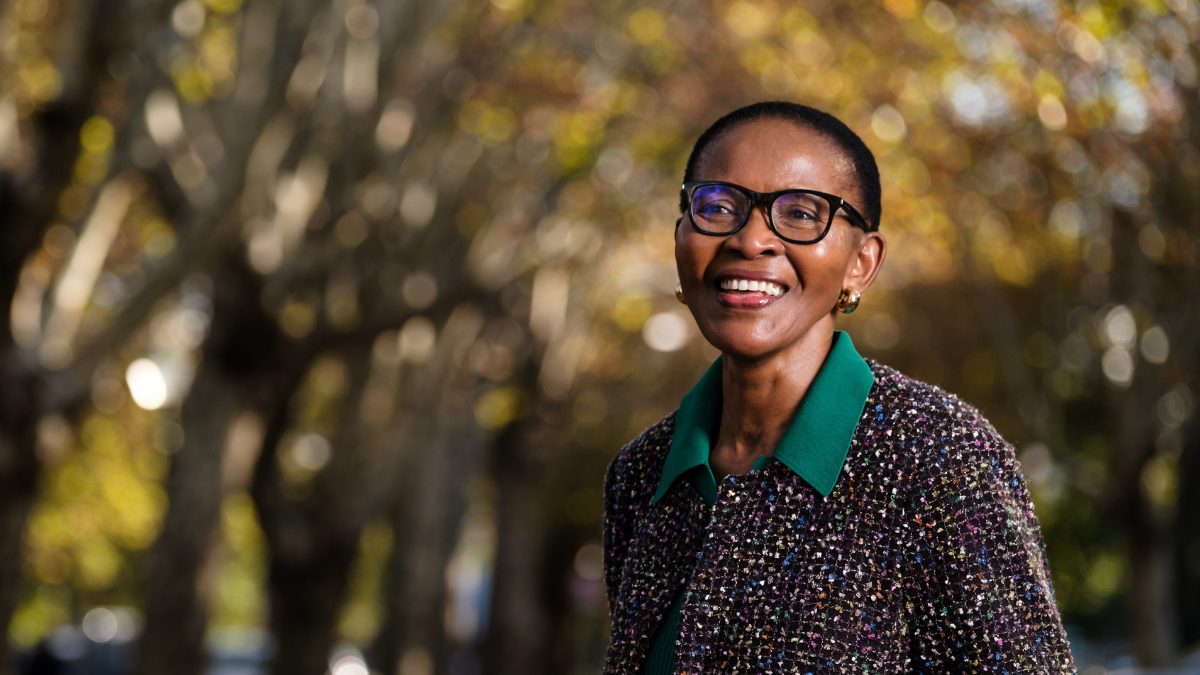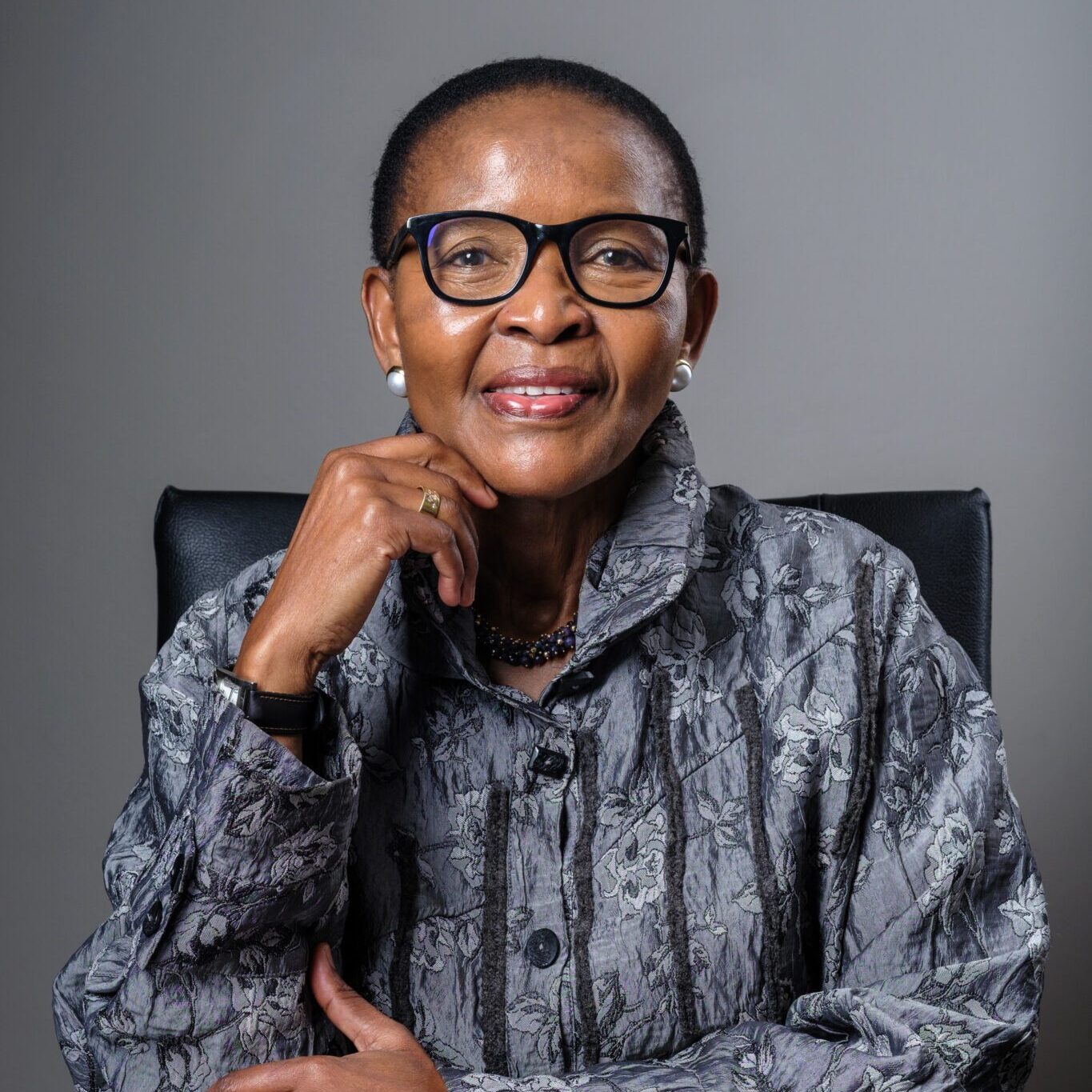She Joins Past Laureates Desmond Tutu and Jane Goodall to Receive One of the World’s Largest Individual Lifetime Achievement Awards
Pennsylvania, USA, June 4, 2024 – The winner of the 2024 Templeton Prize is Dr. Pumla Gobodo-Madikizela. Dr. Gobodo-Madikizela is a professor and South African National Research Foundation’s Chair in Violent Histories and Transgenerational Trauma and the Director of the Centre for the Study of the Afterlife of Violence and the Reparative Quest at Stellenbosch University. Her insights into the mechanisms of trauma and forgiveness in post-apartheid South Africa have created a globally recognized model for social healing in the aftermath of conflict, a model she calls “the reparative quest.”
"The 2024 Templeton Prize winner, Dr. Pumla Gobodo-Madikizela, has a remarkable grasp of the personal and social dynamics that allow for healing in societies wounded by violence. As a psychologist, scholar, and commentator, she has served as a guiding light within South Africa as it charts a course beyond apartheid, facilitating dialogue to help people overcome individual and collective trauma. Her work underscores the importance in contemporary life of cultivating the spiritual values of hope, compassion, and reconciliation."
said Heather Templeton Dill, president of the John Templeton Foundation.
Gobodo-Madikizela, 69, was an influential member of the Human Rights Violations Committee of South Africa’s Truth and Reconciliation Commission that aimed to address the injustices of apartheid. Her award-winning 2003 book A Human Being Died That Night recounts her conversations with the former commander of state-sanctioned death squads, Eugene de Kock, and argues for the possibility of remorse, accountability, and forgiveness.
Her career as a scholar and a public figure is distinguished by her effort to repair ruptures created by past violence and to build a path toward healing and restoration in an ongoing process she calls “the reparative quest.” In international lectures and books, she displays keen powers of sympathy and a deep feeling of humanity toward victims as well as perpetrators of traumatic experiences.
Dill added: “Her achievements mark her as a leading figure in understanding and confronting the deeply rooted psychological scars borne by those who experienced unimaginable loss.”
In a statement for the Templeton Prize, Gobodo-Madikizela said: “Through the many encounters I had in my work when I served on the Truth and Reconciliation Commission, I learned that ordinary people, under certain circumstances, are capable of far greater evil than we could have imagined. But so are we capable of far greater virtue than we might have thought. My research is based on this possibility of human transformation, on probing deeper to understand the conditions necessary to restore the values of what it means to be human—to want to preserve the dignity and life of the other. This is the essence of an accountable Ubuntu, a word from my language that is a foundational moral force that reaffirms our shared humanity. I feel a deep sense of gratitude for this prize. The great opportunity it opens for me to work with the next generation of future leaders who will pursue research on these urgent questions is a rare gift.”
-

2024 Templeton Prize Winner Pumla Gobodo-Madikizela photographed in Cape Town, South Africa by Stefan Els for the Templeton Prize
Background
Gobodo-Madikizela was born in 1955 in Langa, one of the oldest townships designated for Black residents outside Cape Town, South Africa. She is the eldest daughter of Tukela and Nobantu Gobodo. Growing up under apartheid, she bore witness to the harm of segregation, discrimination, racism, and state brutality. She remembered hiding as tanks drove through her neighborhood. Only when returning to the area in freedom later in life could she appreciate the natural beauty of her home: until the end of apartheid, “I never actually thought of Cape Town as my city,” she said in a video statement for the Templeton Prize, adding that now many South Africans once excluded from society can appreciate the country’s beauty as an “act of reclamation.” Amid this outer oppression and strife, her loving parents raised her with compassion and instilled in her the values of integrity and caring for others.
She went to a boarding high school at Inanda Seminary in Durban, at the time the only private school for Black girls in South Africa, then pursued a bachelor’s degree in psychology at the University of Fort Hare. She later earned a master’s degree in clinical psychology from Rhodes University, focusing on the effects of apartheid on the psychological well-being of Black South Africans. Her early research laid the foundation for her lifelong commitment to exploring the emotional and psychological toll of apartheid on both victims and perpetrators, an interest that led to her doctoral research on violence. She graduated with a PhD degree in psychology from the University of Cape Town.
In the 1990s, with the end of apartheid, Gobodo-Madikizela joined the Truth and Reconciliation Commission (TRC) and served as the Chair of the Human Rights Violations Committee in the Western Cape office of the TRC, based in Cape Town. In this role, she served alongside 2013 Templeton Prize winner Archbishop Desmond Tutu, who was appointed by Nelson Mandela to chair the TRC. Her interactions with apartheid-era perpetrators, including Eugene de Kock, a former police colonel who was nicknamed “Prime Evil,” led her to grapple with the profound question of whether forgiveness could be extended to those who had committed heinous crimes.
Her groundbreaking multiple award-winning book A Human Being Died That Night: A South African Story of Forgiveness, recently reprinted as a Mariner Classic, was a result of her interviews with Eugene de Kock. In the book, she explores the inner workings of forgiveness and the capacity of human beings to empathize with one another, even in the darkest of circumstances. The book has been published in multiple translations and was winner of the Alan Paton Award (known as the “Pulitzer” for South African non-fiction), and the Christopher Award. The book was adapted into a stage play that premiered at the Hampstead Theatre in London in 2013.
Gobodo-Madikizela’s academic career continued to flourish, and she held various prestigious positions at institutions such as the University of Cape Town, University of the Free State, and Stellenbosch University. Her research explored topics including empathy, and forgiveness, post-apartheid identity, post-Holocaust dialogue, transgenerational trauma, and memory. She has authored articles and edited and co-edited book volumes on these topics. Gobodo-Madikizela is a socially engaged scholar and has remained focused on research on the transgenerational legacies of historical trauma and the “reparative quest” that must follow to restore justice in society.
In addition to A Human Being Died That Night, she is the co-author of Narrating Our Healing: Perspectives on Healing Trauma (2007). She has edited and co-edited several book volumes including Memory, Narrative and Forgiveness: Perspectives on the Unfinished Journeys of the Past (2009), as co-editor, as editor of Breaking Intergenerational Cycles of Repetition: A Global Dialogue on Historical Trauma and Memory (2019), and History, Trauma and Shame: Engaging the Past through Second Generation Dialogue (2020), and co-editor of the anthology Post-Conflict Hauntings: Transforming Collective Memories of Historical Trauma (2020).
Gobodo-Madikizela is a Radcliffe Institute fellow. Among the honors she has received are: The Harry Oppenheimer Fellowship Award (2020), considered the most prestigious academic award in Africa, an honorary Doctor of Laws from Rhodes University (2019); honorary Doctor of Theology from the Friedrich-Schiller University, Germany (2017), and she received the “Social Change Award” from Rhodes University for “a contribution made by a leading psychologist to social change in South Africa.” Since 2017 she has held an honorary professorial position at Queen’s University, Belfast, affiliated with the Senator George J. Mitchell Institute for Global Peace, Security and Justice.
Dr. Gobodo-Madikizela joins a list of 53 Prize recipients including St. Teresa of Kolkata (the inaugural award in 1973) and the Dalai Lama (2012). The 2023 Templeton Prize was awarded to the nurse and midwife, Dr. Edna Adan Ismail. Preceding her was theoretical physicist Dr. Frank Wilczek (2022) and ethologist and conservationist Dr. Jane Goodall (2021). Other social scientists who have won the Prize include Michael Bourdeaux, founder of the Keston Institute and Michael Novak, philosopher and diplomat. She is the third South African to win the award, preceded by Archbishop Desmond Tutu (2013) and physicist George Ellis (2004).
About the Templeton Prize
Established in 1972, the Templeton Prize is one of the world’s largest annual individual awards. It is given to honor individuals whose exemplary achievements advance Sir John Templeton’s philanthropic vision: harnessing the power of the sciences to explore the deepest questions of the universe and humankind’s place and purpose within it. Currently valued at £1.1 million GBP, the award is adjusted periodically so it always exceeds the value of the Nobel Prize. Winners have come from a wide range of faiths, fields, and geographies, and have included Nobel Prize winners, philosophers, theoretical physicists, and one canonized saint. The Templeton Prize is awarded by the three Templeton philanthropies: the John Templeton Foundation, based in West Conshohocken, Pennsylvania, and by the Templeton World Charity Foundation and Templeton Religion Trust, based in Nassau, The Bahamas. To learn more, visit TempletonPrize.org
Contact:
Benjamin Carlson
bcarlson@templeton.org
Thomas Burnett
tburnett@templeton.org

